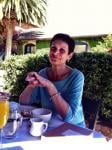The Cancer Survivors Network (CSN) is a peer support community for cancer patients, survivors, caregivers, families, and friends! CSN is a safe place to connect with others who share your interests and experiences.
Sharing an article

Though it may be geared for the "newbie" to cancer, I think it has insights/thoughts
worth sharing for all of us here. I think most of us will identify with his words.
He was diagnosed with Leukemia at age 27 and wrote this piece from "the other side
of cancer" at age 28, now in remission. My friend, incidentally is a survivor of
the same cancer as me (Diffuse Large B Cell Lymphoma) so he "gets it".
I know a lot of us are going through hell right now with a new diagnosis
or recurrence. Usually I post funny or silly things (lovingly of course) but
lately I just haven't felt that jovial. I hope I'm not becoming a grumpy
old man
and always the ability to laugh in the face of your enemy.
Small quote from the article:
"...That only you walk this earth with 100% investment in you. Make the investment and use this as an opportunity to reexamine your self-worth. Love yourself more than ever and recognize how much love there is for you in the world. Then start sharing that love. You will come to see that even when you are the neediest person you know you can still be giving. Giving will make you feel better than taking... "
Hugs,
Jim
The Things I Wish I Were Told When I Was Diagnosed With Cancer
Comments
-
-
Thank you!
Hi Jim, Thank you so much for posting that wonderful article. Wow! I was diagnosed three weeks ago with Large B Cell Diffuse Mediastinal Lymphoma and started my first cycle of Chemo two weeks ago. Three weeks and a day ago I was completely young, strong and looking forward to a wonderful summer with my family. Life changed in a day!
Thanks again, Whitney -
Created a new post for youwhitneytheartist said:Thank you!
Hi Jim, Thank you so much for posting that wonderful article. Wow! I was diagnosed three weeks ago with Large B Cell Diffuse Mediastinal Lymphoma and started my first cycle of Chemo two weeks ago. Three weeks and a day ago I was completely young, strong and looking forward to a wonderful summer with my family. Life changed in a day!
Thanks again, Whitney
Hi Whitney and welcome. I sent you an email and opened
a new thread/post for us to properly welcome you. You can
click on the link below to open that post .
.
Welcome Whitney
Hugs and positive thoughts,
Jim
DX: DLBL 4/2011, Chemo completed 10/2011, currently in remission.
-
Thank you Jim
Dear Jim,
Thank you very much for sharing such a wonderful article. I too saved this article.
I want to take the time to thank you for always making the time to answer so many
questions and giving helpful advice to others. Also, giving hope where hope is
needed. I have no idea how busy your daily routine is? No matter, I just know
you make the time.
Many hugs and love. Love Maggie -
-
Spot On !jimwins said:Thanks
Thanks everyone for all the comments. I think
this guy accurately describes the experience and
it's helpful reading.
Hugs,
Jim
Jim,
Your forwarded article, to be short, was so packed with insight. I had not read it until today.
I noticed several behaviors while I was sick that parallel things mentioned there, and wonder if others have encountered this as well.
1. I did not know at the time, but my two kids, who where (and still are) teenagers, were very much uninformed about my condition and prognosis. I felt guilty when I discovered this, and wished that I had given them more detailed information. My wife and I had thought that we were "protecting" them by mnimizing things, and saying that I was "fine" (undoubtedly the most meaningless term in the English language). When you are in late stage cancer, you are not "fine", regardless of prognosis, and everyone knows it.
2. Many people, especially ones you know only a little or casually, will be afraid to approach or ask or say anything. We were leaving church one day, and a mother of kids at our school whom we knew fairly well, pulled my wife aside discretely, while I walked on out to the car. I asked my wife when she got out, "What did Mrs so-and-so want?" She said, "She wanted to know how you were -- if you are OK." It was a guestion the woman most likely would have never asked me directly. I found this to be quite common. But, if you do give a casual friend an opening, they will ask questions, as if they crave insight. Not in a prying way, but because cancer is a mystery to many.
3. This is UNSPOKEN, but I have detected an undercurrent among some whom do not know you well having an attitude of "Oh. I heard you have late-stage cancer. How long until you are dead ?" They will NOT USE THESE WORDS, but you can sort of read their thughts. I have seen this even among non-oncology medical personnel. Sommetimes it will be from, say, of an RN, who might say something like, "Hodgkins diseae. Used to be a lot of our pients died from that, but treatments are much better today", or "What is the prognosis for that, do you have a very good chance for survival?" They cloak the question with "clinical garb', in effect.
4. A sub-response of #3 is the person (it can seem mean-spirited, and perhaps is) who will in effect, at least indirectly, ask if you have relapsed, or if you might. They will spontanoeously mention a friend with a disease similiar to your, and describe how they were in remission, but then "relapsed and died quickly." The message there is not subtle.
Most folks, I guess, are kind and well-intended. I studied a lot of interrogation psychology, deception techniques, and body language in the military. I have been polygraphed many, many times, so maybe I am more sensitized to these things than most. I don't know, but I would be intersted if any of you have sensed these responses from the people around you.
max
. -
Hey MaxSpot On !
Jim,
Your forwarded article, to be short, was so packed with insight. I had not read it until today.
I noticed several behaviors while I was sick that parallel things mentioned there, and wonder if others have encountered this as well.
1. I did not know at the time, but my two kids, who where (and still are) teenagers, were very much uninformed about my condition and prognosis. I felt guilty when I discovered this, and wished that I had given them more detailed information. My wife and I had thought that we were "protecting" them by mnimizing things, and saying that I was "fine" (undoubtedly the most meaningless term in the English language). When you are in late stage cancer, you are not "fine", regardless of prognosis, and everyone knows it.
2. Many people, especially ones you know only a little or casually, will be afraid to approach or ask or say anything. We were leaving church one day, and a mother of kids at our school whom we knew fairly well, pulled my wife aside discretely, while I walked on out to the car. I asked my wife when she got out, "What did Mrs so-and-so want?" She said, "She wanted to know how you were -- if you are OK." It was a guestion the woman most likely would have never asked me directly. I found this to be quite common. But, if you do give a casual friend an opening, they will ask questions, as if they crave insight. Not in a prying way, but because cancer is a mystery to many.
3. This is UNSPOKEN, but I have detected an undercurrent among some whom do not know you well having an attitude of "Oh. I heard you have late-stage cancer. How long until you are dead ?" They will NOT USE THESE WORDS, but you can sort of read their thughts. I have seen this even among non-oncology medical personnel. Sommetimes it will be from, say, of an RN, who might say something like, "Hodgkins diseae. Used to be a lot of our pients died from that, but treatments are much better today", or "What is the prognosis for that, do you have a very good chance for survival?" They cloak the question with "clinical garb', in effect.
4. A sub-response of #3 is the person (it can seem mean-spirited, and perhaps is) who will in effect, at least indirectly, ask if you have relapsed, or if you might. They will spontanoeously mention a friend with a disease similiar to your, and describe how they were in remission, but then "relapsed and died quickly." The message there is not subtle.
Most folks, I guess, are kind and well-intended. I studied a lot of interrogation psychology, deception techniques, and body language in the military. I have been polygraphed many, many times, so maybe I am more sensitized to these things than most. I don't know, but I would be intersted if any of you have sensed these responses from the people around you.
max
.
I've encountered most of this. Part of it is our culture.
We're not comfortable with death and mortality so it's almost
a taboo topic and certainly an uneasy one to discuss. And of course
there's the fear factor (mortality). Many people equate cancer with death.
I had no idea so many advances had been made in the past several years
until my journey began.
I've certainly been guilty in the past .
.
How about this one:
I had friends/relatives (while I was in treatment) say something to the effect of
"you're looking good". Let's see, I had no eyelashes, facial, head or pubic
hair (not that they could see that), non existent eyebrows, the complexion
of "Casper" and was constipated a lot of the time (hard to be "perky" when
you're blocked up). In short, I looked like fried fesces and I knew it .
.
It's very human and I understand it. I never really felt badly toward anyone.
Most of us here rarely use the word "death" or "die" for good reasons I suppose.
We're attempting to remain positive, encouraging and supportive of each other.
Those just aren't encouraging words - right? And I think we don't want to jinx
anything for anyone or ourselves.
On a more positive note, I think we've all learned a little (maybe a lot) more
about love and what's really important in life. I've certainly lightened my
baggage on this journey .
.
Jim
Discussion Boards
- All Discussion Boards
- 6 Cancer Survivors Network Information
- 6 Welcome to CSN
- 122.6K Cancer specific
- 2.8K Anal Cancer
- 457 Bladder Cancer
- 312 Bone Cancers
- 1.7K Brain Cancer
- 28.6K Breast Cancer
- 407 Childhood Cancers
- 28K Colorectal Cancer
- 4.6K Esophageal Cancer
- 1.2K Gynecological Cancers (other than ovarian and uterine)
- 13.1K Head and Neck Cancer
- 6.4K Kidney Cancer
- 685 Leukemia
- 804 Liver Cancer
- 4.2K Lung Cancer
- 5.1K Lymphoma (Hodgkin and Non-Hodgkin)
- 243 Multiple Myeloma
- 7.2K Ovarian Cancer
- 71 Pancreatic Cancer
- 493 Peritoneal Cancer
- 5.7K Prostate Cancer
- 1.2K Rare and Other Cancers
- 544 Sarcoma
- 744 Skin Cancer
- 661 Stomach Cancer
- 194 Testicular Cancer
- 1.5K Thyroid Cancer
- 5.9K Uterine/Endometrial Cancer
- 6.4K Lifestyle Discussion Boards






